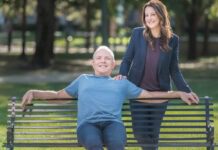Maintaining Quality of Life: Part 3 of 4
Contributed by: Greta Salmi
Find part 1: The Shock of Diagnosis
Find part 2: Happy Moments Amidst Advanced Disability
When my husband, already living with debilitating Muscular Dystrophy, was diagnosed with other, severe medical issues, we had to dig deep to keep ourselves going. We never gave up on having fun but what “fun” is changed tremendously.
The first year into our current home we started a myriad of home improvements to make life doable for Joel’s deteriorating condition — a walk-in shower, a changed toilet, and more ramps for outside transitions, new hardwood floors instead of carpet. Joel became a pro with voice-activated systems for texting and phone calls. His new girlfriends are Siri and Alexa. Books are read aloud through an app on the phone, which has changed his life. He can use the advanced technology of these smart phones to read, listen to music, use voice-to-text functions, and look up information. It is a gift. We can discuss books and politics, we can argue about authors and recipes, and we still find enormous sources of pleasure in the world and of the mind. Thanks to our tech savvy son-in-law, Joel can now control the TV with his voice. Ah! Control!
We were so lucky to have great neighbors who have become dear friends. After Joel had neck surgery, they came over one night for hours to help me with some remarkably tough and intimate physical issues. They kept their sense of equilibrium and humor. Without humor, I think we would both have given up a long time ago.

Before Joel contracted Muscular Dystrophy, I never thought about the challenges of getting around. Now I think about the one step at the entrance of a friend’s home or whether his scooter will fit into a bathroom. I worry about how Joel might escape a fire or how to get around a sidewalk blocked by a fallen tree. So much that we able-bodied people take for granted is a huge problem for someone who can’t walk.
Joel still reviews contracts and provides legal advice for family and friends when asked. I had seen Joel’s mother living in a very limited world after she could no longer walk. She had few direct experiences of her own and lived through news from her family. I wanted my husband to have his own experiences and not live through mine. I kept pushing him to reach out and volunteer more, but much of his energy was spent just getting through each day. Eventually, I realized that it was my need, not his. I needed to feel that my life had meaning outside my role as wife, mother, grandmother and caregiver. I volunteered and found part-time work coaching new principals, which gave me deep satisfaction.
In 2013, Joel had to give up driving. With me behind the wheel, we had several years of car travel, visiting friends, and our West Coast son and his family. Joel was able to join me for walks on paved trails in national parks on his scooter, see cliffs overlooking the Pacific Ocean at Big Sur, and visit West Coast museums. We traveled in a Honda van with ramps. We lugged around a Hoyer Lift, which is like an engine lift that can move people who can’t walk short distances. It uses a cloth sling to lift a person into the air and then rolls them to the next stop. We filled the van with what was needed: a variety of pillows to support his legs and arms while sleeping; foam to duplicate the angle of the adjustable bed at home; and lots of supplies for the toileting and cleaning we had to manage in motel rooms. There was hardly room for clothes.
More Medical Problems
“Can you read a bedtime story?” I asked Joel one evening when our grandkids were visiting. He read haltingly and I wondered why. “The words keep jumping around the page and the letters won’t stay in one place,” he said. At the end of an eye exam, an ophthalmologist offhandedly said, “Well, you have macular degeneration and there is nothing I can do. My assistant will be in soon to finish up.” And he left! The bright spot in that diagnosis meant that while details in the center of Joel’s vision would diminish, he would never be completely blind, seeing only darkness. The only upside of his blurred vision is that he thinks I still look young.
“Is there anything that can help?” I had asked another ophthalmologist. “There is a resource center that can give you lots of ideas,” he replied. We would never have known. It seemed everything important was uncovered by asking, and then asking someone else. It was like that with every resource. We had to ferret out information to confront all that we didn’t know.
Soon, we discovered that Joel had developed deep vein thrombosis in his left leg, which can develop into pulmonary embolisms, clots in one of the arteries that go from the heart to the lungs and which can prove fatal. “Hmm,” I thought. “Is Joel’s first name really Job, the Biblical character who suffered a plague of continuous bad luck?”
“What will help?” I asked the cardiologist. He was silent for several seconds and then said, “Live close to Stanford Medical Center.” The more practical solution was blood thinners. But they made him prone to bruising and bleeding. Age, the MD, and blood thinners combine to make his skin susceptible to huge bruises. People shake his hand and leave ugly marks on his skin.
In these last two-and-a-half years Joel is only able to transfer with the aid of a Hoyer Lift. Usually, it took two people to use it. Always physically strong, I learned to do all of Joel’s transfers myself. All of these tugs of clothing and adjusting the straps of the sling often meant that my husband was getting beat-up with bruises and small cuts I caused! It was devastating to be harming him, and it became equally devastating to be scolded for not doing everything I had to do right.
“I feel criticized and demeaned,” I told our new counselor. “I was the child my parents didn’t have to scold because I was always so hard on myself.” The counselor listened and asked questions about how Joel’s tone of voice affected me, and about what we could each do differently. It was damn hard work to figure this out. Remembering the intense love we have for each other, and the years of good times, helped. Thirty-three years of knowing each other, 31 of them married, have increased our emotional banking account. All those years of an easier happiness gives us confidence and courage.
Loss of Spontaneity
One of the things we have lost is a sense of spontaneity. I imagined that when the kids were independent, we would be taking spur-of-the-moment trips. Everything has to be organized. I am responsible for every supply, medicine, and piece of equipment. For life to be any fun, things have to be planned and must go smoothly. Illness, usually of the intestinal tract nature, or upsets with equipment, and Joel is grounded. And every time he is grounded, I am grounded. I often feel despair.
During the earlier part of the day, Joel needs nearly continuous help. I get him out of bed with the lift and into the power chair, then get a shirt on him and a blanket over his legs. We move to the kitchen table. I get him warm water, which helps the lower G-I get moving. I feed him his morning banana. I get his phone and then the newspaper. Turn the paper to one section, wait a minute, and turn to another section. Wait a minute. Morning coffee with a straw, positioned just so. A few more minutes, change sections of the paper. Give him more warm water and a straw and feed him his morning medications. All this before 7:15 a.m.
When he’s ready, I use the Hoyer Lift to get him to the bathroom, and help out there. Finish that. Hoyer Lift back to the power chair. Back to the kitchen. More time for breakfast, which means feeding him eggs, scrambled or fried. Rejoice! He can still feed himself toast. Repeat the bathroom routine again. Another break in time while he is in the bathroom for me to mop the kitchen floor, or vacuum the rugs, or empty the dishwasher. Finish with the bathroom again. Back to the kitchen where I hand him the electric toothbrush and floss stick like a surgeon’s assistant, hands the surgeon sutures and clamps.
Short breaks in the routine give me five or ten minutes to check email, make lists, or do some cooking. Stop. Finish with the bathroom again, move back to the power chair with the Hoyer Lift. Lift his feet, put on compression socks, position a pillow under his feet, check for pressure sores, get him comfortable, back to the kitchen area. Set up his phone on the counter so that he can check it, or use Audible to read on his phone, or use Alexa to turn on and adjust the TV for the golf channel or news. It’s not as if we don’t banter and enjoy each other’s company; we do. It is just that time is dictated by the demands of his body, which are non-negotiable. It’s now about 9:30 a.m.
Getting started on any project – cleaning, phone calls, writing, or work reports is always subject to interruptions. Sometimes, I can start and stop and resume my train of thought. If I can’t concentrate, I get angry and resentful. We get caught in an unhappy dance. I work to stay positive.
Out of all this, there is a relentless tedium. We still squabble over who is in charge. For example, when helping him get dressed, his arms need to go into the shirt first, and then it gets gently pulled over his head. There are no choices here: arms first, then head. But sometimes I switch which arm I slide in first. “You don’t know how to spell routine, do you?” Joel asks.
I want to be gentle and competent, but I sometimes space out. I have started to move Joel without completely attaching all four straps of the Lift’s sling. Sometimes I repeat a step of bathroom care, sometimes I skip one.
“Stop!” he says firmly. “Get your head in the game!” I think to myself, “If this is your idea of a game, you have a very warped sense of play.” Sometimes I can meet the reminders with sincere chagrin and an embarrassed thank you. Other times I meet them with clenched teeth. It’s a course in advanced humility and I am not a star pupil.
A new friend asked recently, “How do you both spend your days?” I was struck with my need to conceal the truth: I spend my time helping another person live. If Joel is ready to leave the house by 2 p.m. I consider it a good day. Many people who care for people with these kinds of diseases don’t get out of the house at all. Do I sound like “poor me?” I don’t want to be that person.
GRETA SALMI lives with her husband, Joel, in the S.F. Bay Area. She coaches educators and was a school principal for nineteen years. She can be reached via Twitter, @GretaSalmi.

































